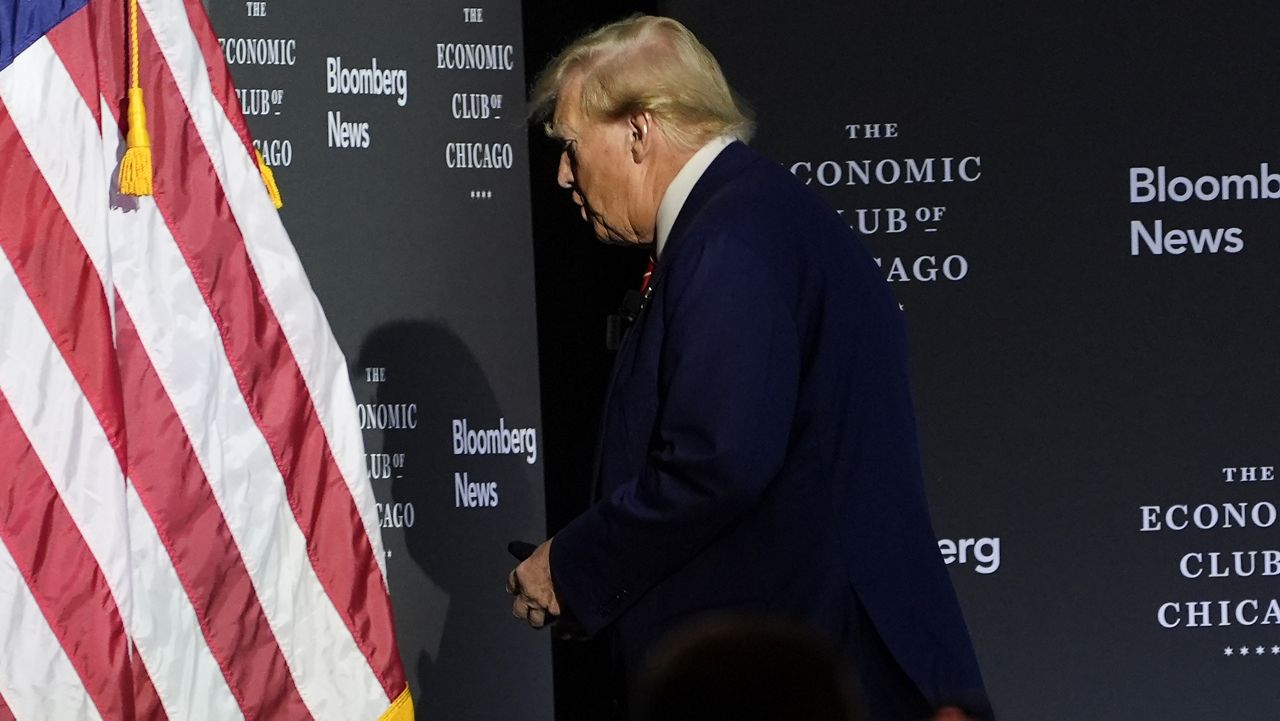Tuossa on Trumpin Bloombergin Economic Club haastattelu. Hänen suosimistaan talous systeemeistä voi olla tietysti mitä mieltä tahansa, mutta kognitiivisesta testeistä hän selviää tämän perusteella.
He myös kutsuivat Kamalan haastatteluun, mutta hän ei ole ainakaan vielä vastannut myöntävästi.
Transscript on bloombergin maksumuurin takana, niin piti selata otteita muualta, kun ei koko settiä jaksanut katsoa.
Bloomberg’s John Micklethwait tried nobly to bring Trump back to the realm of the real, but nothing doing.

www.esquire.com
Donald Trump was unable to give coherent answers on his economic plans in an interview with Bloomberg at the Economic Club of Chicago.

www.rollingstone.com
When asked what he will do to protect consumers from the high prices his tariffs are expected to cause, Trump denied that would happen.

ny1.com
Puhetta oli ilmeisesti riittämiin, mutta kysymyksiin vastailua vähemmän.
- Googlen pilkkomiseen vastaamiseen sijasta oli Virginian äänestäjärekisterin siivoukseen vastaamista.
- Vallanvaihto 2020 oli trumpin mukaan rauhallinen. Very peacefull, love and peace.
- Vastauksena miten maahanmuuttajien karkoitukset vaikuttaa työmarkkinoihin tuli vain rikollisista maahanmuuttajista.
- Käytännön vastauksena hallinon konkreettisiin säästöihin vastauksena oli uuden air force onen hankinta.
- Pienten yritysten auttamisessa tuli vain Applen auttamista.
- Ekonomistit on väärässä ja hänen ehdotukset eivät aiheuta velkaa/budjetin alijäämää.
- Tullit on kauniita ja ne ei vaikuta ameriikkalaisiin, kun yrityset palaa samantien jenkkeihin.
Pari lainausta alla keskusteluista:
Micklethwait: Should Google be broken up?
Trump: [Deep sigh] I just haven’t gotten over something the Justice Department did yesterday, where Virginia cleaned up its voter rolls and got rid of thousands and thousands of bad votes. And the Justice Department sued them, that they should be allowed to put those bad votes, those illegal votes, back in and let the people vote. So I haven’t gotten over that. A lot of people have seen that, and they can’t even believe it.
M: The question was about Google, President Trump.
Vaalilupausten hinnoista (sinänsä hyvä, kun haastattelussa Trump haukkui Bideniä tolkuttomasta tuhlauksesta ja lainanotosta).
M: The markets are looking at the fact that you are making all of these promises. The latest one was car loans; you are flooding the thing with giveaways. I was actually quite kind to you. I used $7 trillion. The upper estimate is $15 trillion. People like The Wall Street Journal, hardly a communist organization, they have criticized you as well. You are running up an enormous debt.
T: What does The Wall Street Journal know? They’ve been wrong about everything. So have you....You’ve been wrong all your life on this stuff.
At one point, after Trump spent minutes meandering through multiple trains of thought in response to a question about the American dollar’s status as an international reserve currency, Micklethwait attempted to interject into his rambling. Trump wasn’t happy.
“You have got to be able to finish a thought because it is very important,” Trump said.
“You’ve gone from the dollar to [Emmanuel Macron],” Micklethwait countered.
The former president claimed that his speaking style was “called the weave” and that “it’s all these different things happening.”
When asked what he will do to protect consumers from the high prices his tariffs are expected to cause, Trump denied that levying a tax on all imports into the country wouldn’t raise costs for Americans.
“Critics say your tariffs will end up being more or less a sales tax,” Micklethwait said. “If America, at the moment, has $3 trillion worth of imports. You’re going to add tariffs to every single one of them – that’s going to push up costs for all those people who want to buy foreign goods.”
“No,” Trump responded.
“It’s simple mathematics,” Micklethwait pushed back.
“Yeah, it is, but the way you figure it. I was always very good at mathematics,” Trump said. “The higher the tariff, the more likely it is that the company will come into the United States and build a factory.”
When Micklethwait noted it could be years of high tariffs — and therefore high consumer costs — before companies could successfully relocate manufacturing to the U.S., Trump argued that if the “tariffs are going to be so high, so horrible, so obnoxious, they’ll come right away.”

/img-s3.ilcdn.fi/894a606bf647892b1ac20ceacb06183b11e85ef2f3d440f04b4fb85de9f051df.jpg)



